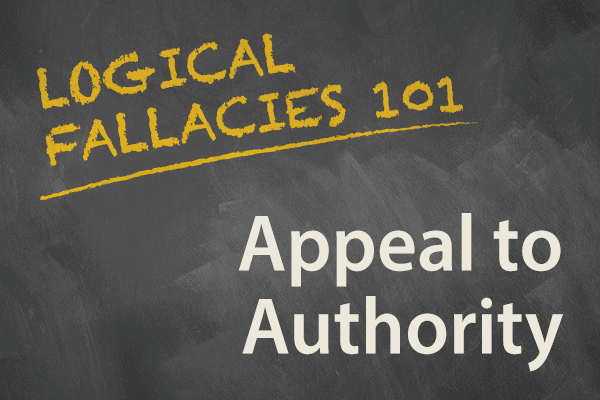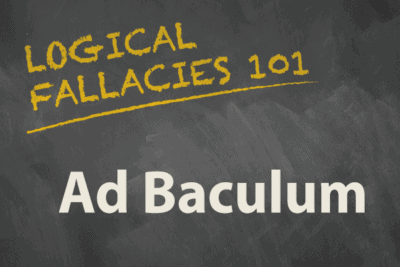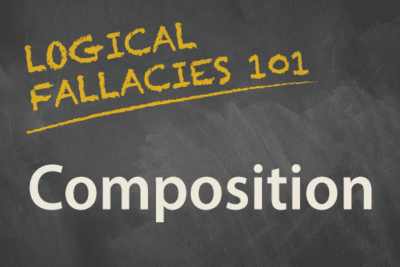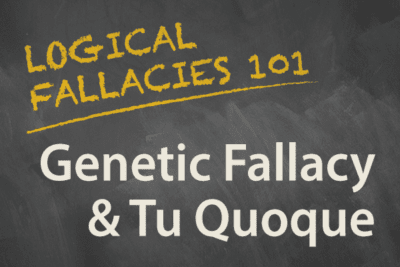By Donald Sanchez,
Introduction
Fallacies of Weak Induction are logical fallacies that occur when the premises of an argument provide a weak support for the stated conclusion. In this type of fallacy, it is not necessarily the case that the premises are logically irrelevant to the conclusion, but rather the relationship between the premises and the conclusion are not strong enough to convince a reasonable person that the conclusion is true given the premises.
Ad Veracundiam Definition
The fallacy ad verecundiam is an appeal to an unqualified authority. The fallacy occurs when someone claims a certain conclusion is true because someone else, who is not an authority on the subject, says it is true. The simple fact that a movie star won 7 Oscars does not qualify him as an expert authority on climate change.
Ad verecundiam fallacies often occur when there is confusion between two different types of authority (See Jamie Whyte, Crimes Against Logic, 20). For example, one type of authority is the kind of authority parents, teachers, coaches, and drill instructors possess. When you were young and asked your parents why you had to do something you did not want to do, the answer they typically gave was “because I said so, that’s why.” There was not much room for argument. Mom and dad called the shots. In boot camp, when the drill instructor yells, “Get down and give me fifty!” you don’t ask, “Why can’t I just do 10 Sgt. Major?” You immediately drop down and bang out 50 push-ups! These individuals wield authority by virtue of the positions they hold. This type of authority is called deontic authority (having to do with duty or an obligation). You have a duty or obligation to submit to the authority of your parents or your drill instructor. But, not all forms of authority require the same obligations.
Suppose you had a science question from school about the particle-wave duality in quantum physics. You go to your dad who just received the “Realtor of the Year” award at his local real estate company, and he gives you his answer. It doesn’t make sense (but then again, nothing in quantum physics does). You humbly ask, “But how do you know that’s true?” To which your dad replies, “Because I said so, that’s why.” The next day you go to class and participate in a discussion about particle duality and give your dad’s answer. You insist he’s right. After all, he is the authority in your home. Well, here is a case where deontic authority doesn’t cut it. Quantum physics is outside the scope of your dad’s parental authority. Your dad may know real estate, but he doesn’t know quantum physics.
However, suppose your dad is John C. Polkinghorne, the brilliant, former chair of Mathematical Physics at Cambridge University. The answer to the question “But how do you know that’s true?”—“Because I said so, that’s why”—holds a different kind of weight than the answer given by an award winning real estate agent. This second type of authority is called epistemic authority (relating to knowledge). John Polkinghorne has an expertise in the field of physics. Therefore, he answers questions about physics with epistemic authority; Polkinghorne knows physics. By appealing to the opinion of an expert in the field of physics—while not guaranteeing a correct opinion—does not violate ad verecundiam. This would be an example of an appeal to a legitimate authority.
How to Avoid Committing the Ad Verecundiam Fallacy
To avoid committing the ad verecundiam fallacy, the basic form of the argumentation scheme should look like the following (Douglas Walton, Chris Reed, and Fabrizio Macagno, Argumentation Schemes, 310):
- E (John Polkinghorne) is an expert in subject S (physics) containing proposition A (answer to the question about particle duality)
- E asserts that proposition A is true (or false)
- A is true (or false)
Simply stated, if E is not an expert in S, the conclusion A is weak and the fallacy has been committed.
Recall, however, that the fact someone claims to be an authority in any particular area does not necessarily guarantee that (1) he is in fact an authority or (2) the claims he is making are true. An individual’s argument from authority should be weighed by asking several important questions (Douglas Walton and Marcin Koszowy, “Two Kinds of Arguments from Authority in the Ad Verecundiam Fallacy,” 2):
- Expertise Question: How credible is E as an expert source?
- Field Question: Is E an expert in the field F that proposition A is in?
- Opinion Question: What did E assert that implies A?
- Trustworthiness Question: Is E personally reliable as a source?
- Consistency Question: Is A consistent with what other experts assert?
- Backup Evidence Question: Is E’s assertion based on evidence?
It is important to ask these questions because it could be the case that an “expert” can be wrong. When you appeal to the authority of another, you want to ensure that you are appealing to a legitimate authority in the field you are discussing and the claims being made by that authority are consistent with other experts in the field. The fallacious appeal to authority most often occurs when an illicit appeal is made to the authority’s competence from one field to another (T. Edward Damer, Attacking Faulty Reasoning, 32).
Examples of Committing the Fallacy
The well-known neo-atheist Richard Dawkins wrote a chapter in his bestselling book, The God Delusion, on the roots of morality. He makes the argument that religion—more specifically, God—is not necessary for a person to be morally “good.” Dawkins writes,
“If our moral sense, like our sexual desire, is indeed rooted deep in our Darwinian past, predating religion, we should expect that research on the human mind would reveal some moral universals, crossing geographical and cultural barriers, and also, crucially, religious barriers” (Richard Dawkins, The God Delusion, 222).
And we his readers should expect that the research Dawkins appeals to is research conducted by appropriate authorities in the field of moral philosophy. However, Dawkins does not do that. His appeal is to former Harvard professor Marc D. Hauser who wrote the book Moral Minds: How Nature Designed our Universal Sense of Right and Wrong. Hauser studied “animal cognition as a window into the evolution of the human mind” Dawkins writes,
“Hauser has enlarged upon a fruitful line of thought experiments originally suggested by moral philosophers. . . . Where Hauser goes beyond the philosophers is that he actually does statistical surveys and psychological experiments using questionnaires on the Internet, for example, to investigate the moral sense of real people” (Dawkins, 222-23).
Let’s take another look at the argumentation scheme above.
- E (Marc Hauser) is not an expert in subject S (moral philosophy) containing proposition A (universal morals are grounded in biology).
- E asserts that proposition A is true.
- A is true.
To support his argument that morality in human beings is grounded in biology, Dawkins appeals to the authority of a biologist who conducts research in moral philosophy and psychology. It is true that Hauser may have appealed to moral philosophers, however, as Dawkins notes, he “has enlarged upon” and went “beyond the philosophers,” conducting “statistical surveys” and “psychological experiments.” Moral philosophy and psychology are two disciplines in which Hauser is not an authority. He is a credentialed biologist. Philosophy is beyond the purview of biology, and therefore Dawkins has committed the ad verecundiam fallacy by appealing to Hauser.
The fallacy is not only committed within the context of formal philosophical or scientific debates, but is committed in normal every day discourse as well. You have seen commercials featuring well-known actors, sports figures, and musicians endorsing products. Advertisers often appeal to the illegitimate authority of the “rich and famous” to sell products. Political opinions are often expressed at music or film award ceremonies. The fact that people are well-known does not mean that their claims are true or should be trusted. This would be what Peter Kreeft calls “irrelevant authority” (Kreeft, Socratic Logic, 82).
It is my hope that going forward, this will aid you in recognizing when an appeal to a given authority is legitimate or when an appeal to a particular authority is illegitimate. Logic is critical to correct thinking, and correct thinking recognizes logical fallacies.
Interested in becoming a student at Southern Evangelical Seminary?
Donald Sanchez has been married for close to 30 years and is the father of two boys and a girl. He moved to Charlotte after retiring from the New York City Police Department after 21 years. He earned a B.A. in Psychology from The King’s College in New York and is completing an M.Div. degree at Southern Evangelical Seminary. He is a church security consultant at Threat Suppression, Incorporated, and oversees their Church Safety and Security Division.
Bibliography
Damer, T. Edward. Attacking Faulty Reasoning: A Practical Guide to Fallacy-Free Arguments. 3rd ed. Belmont: Wadsworth Publishing Company, 1995.
Dawkins, Richard. The God Delusion. Boston: Houghton Mifflin Company, 2006.
Hurley, Patrick J. A Concise Introduction to Logic. 8th ed. Belmont: Wadsworth Thomas Learning, 2003.
Koszowy, Marcin and Douglas Walton. “Two Kinds of Arguments from Authority in the Ad Verecundiam Fallacy.” Accessed January 6, 2017. https://pdfs.semanticscholar.org/2cad/829b54885526730f29b17af80a005f382c6d.pdf,.
Kreeft, Peter. Socratic Logic: A Logic Text Using Socratic Method, Platonic Questions, and Aristotelian Principles. 3.1 ed. Edited by Trent Dougherty. South Bend: St Augustine’s Press, 2014.
Macagno, Fabrizio, Chris Reed, and Douglas Walton. Argumentation Schemes. Cambridge: Cambridge University Press, 2008.
Whyte, Jamie. Crimes Against Logic: Exposing the Bogus Arguments of Politicians, Priests, Journalists, and Other Serial Offenders. New York: McGraw Hill, 2005.d




 Donald Sanchez has been married for close to 30 years and is the father of two boys and a girl. He moved to Charlotte after retiring from the New York City Police Department after 21 years. He earned a B.A. in Psychology from The King’s College in New York and is completing an M.Div. degree at Southern Evangelical Seminary. He is a church security consultant at Threat Suppression, Incorporated, and oversees their Church Safety and Security Division.
Donald Sanchez has been married for close to 30 years and is the father of two boys and a girl. He moved to Charlotte after retiring from the New York City Police Department after 21 years. He earned a B.A. in Psychology from The King’s College in New York and is completing an M.Div. degree at Southern Evangelical Seminary. He is a church security consultant at Threat Suppression, Incorporated, and oversees their Church Safety and Security Division.







